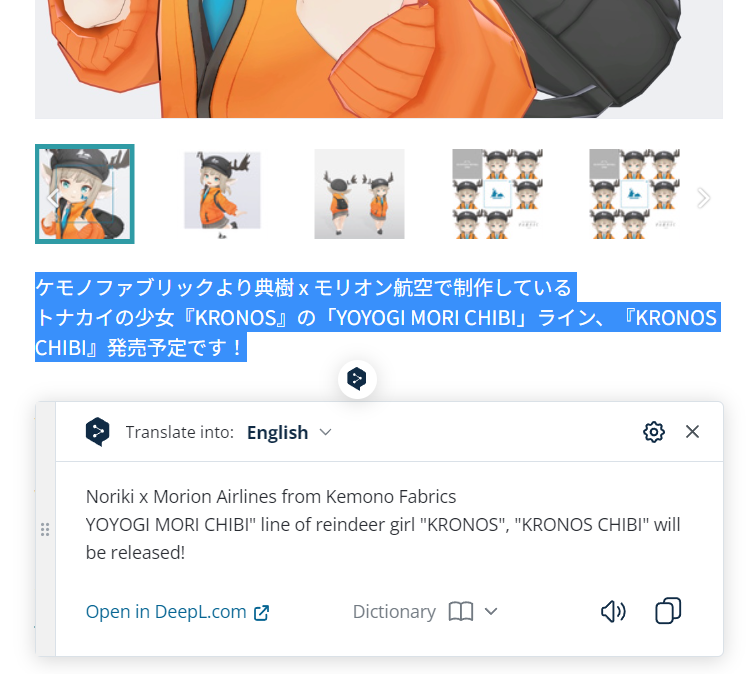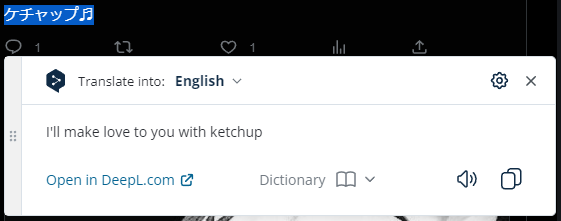The language barrier
Almost all 3D model items from booth.pm will have their basic requirements listed on their item store page. And to no one's surprise these are usually written down in Japanese.
Translation
Since learning Japanese is not covered in this guide, I will present the second best option and that is to use a translation tool.
I recommend using https://deepl.com as the default translation tool. From personal experiences, Google Translate has to many issues with grasping the correct context. For situations like translating pieces of text from a website or a program like Discord, DeepL can be used very effectively and for free.
Example of the DeepL translation tool with the Chrome plug-in
The only downside to DeepL would be that at moments it is to enthusiastic with trying to grasp the context. This sometimes cause it to leave out sentences with crucial information. Another less important issue is that it relies heavily on punctuation, but this is not always adhered to in normal Japanese writing. And probably due to this, it also has a hard time dealing with special characters. I highly recommend to exclude (sanitize) any special characters like emoji and musical notes from the translation input. And also make sure that when sentences are broken up without punctuation, that it might be a good idea break those lines of text on to a new paragraph.
DeepL translation can go wrong with special characters.
Always be weary of the accuracy of the translation.
Luckily most requirements are tend to be mentioned with their official English name. Things like the name of the shader or a specific script like Dynamic Bones. If shaders and/or scripts are not mentioned then there is a chance they are not needed or are included with the package.
Licensing/Legal
***this section is nominated for a rewrite***
It’s very likely there will also be instructions regarding how you may use the avatar. A lot of creators do not want their avatar to be used in a certain commercial setting. And you can be quite sure that it is not allowed to redistribute the avatar. If your looking for an avatar form a Japanese creator that you can distribute on your own behalf then I recommend to read more about that in the section "Cultural barrier".
If you still want to use it for a commercial setting then I highly recommend to get in contact with someone that can read/write Japanese very well and have them contact the creator on your behalf.
Many avatar creators also have limitations in what context you can use the avatar, examples like: for political, religious and/or sexual situations are usually not allowed. Or the creator expects you to use common sense.
The contents of the license might sound silly to you, but I still highly recommend to comply with it. The copyright issue in Japan is a hot potato, and sadly many people in Japan do not enjoy the same protection from the law as a lot of western users do.
Failing to comply with a license may result in a host of issues that are beyond the scope of this manual.
Cultural barrier
And that brings us to the cultural barrier.
Over my time in VRChat for the past three years, I have spoken with several users that contacted creators on booth.pm with requests and commissions. A lot of times the interactions are described as alien from both the customer perspective as well as the avatar creator perspective. (still requesting more information and examples for this)
What I have seen so far is that quite a few of the populair avatar creators are professional model creators, they make VRChat avatars for fun to practice their craft and/or earn a bit of money on the side. When they are approached for a commission then this usually takes place inside VRChat and/or the are introduced by someone they know. The official communication for the project then usually takes place in private on Twitter messages, booth messages, e-mail or on discord.
Depending on the users wishes, a expected price point will be decided. This is calculated based on key factors like "Is good concept art available?", "time scheduling" and "difficulty of the project".
Requests like "Make a replica of a certain copyrighted character (without the rights)", "requests to make something way below the bar of what the creator is capable to do" or "I don't have any concept art, but it must look cool" will usually get instantly rejected.
It is also very possible that the creator for it's real job actually works on a project that is related to what you're requesting, In those situations the creator might decide that based on "conflict of intrest" it will not accept the job.
Some customers are also really surprised about the large price tags that Japanese creators put on their work. From scratch projects that are provided with original concept art can easily go up from 1500 to 3500 USD. (citation needed)
Japanese creators also have a dilemma they worry about a lot. Things like:
- If the customer can't communicate in Japanese, can I then understand and intrepid the wishes of the customer correctly?
- Will the customer understand my standpoints when we encounter a problem in the project?
In these situations Japanese people tend to avoid confrontation. Even though the offer from the customer might be financial attractive, in the end it is possible the request will be refused.



No Comments